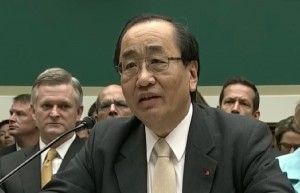Honda is reportedly getting ready to announce the recall of as many as 20 million more airbags due to the risk they could malfunction and injure, possibly kill occupants by sending shrapnel flying into the passenger compartment.
The report, published by Japanese newspaper Nikkei, comes less than a week after the U.S. National Highway Traffic Safety Administration ordered the recall of 35 million to 40 million more airbags using inflators provided by Japanese auto supplier Takata. The defect has so far been linked to hundreds of injuries while the death count last week rose to 13 worldwide.
Hammered by the recall, hit with hefty fines and facing numerous lawsuits, Takata said today that it is expecting to report a loss of about $120 million when it reports earnings on Wednesday. It originally had expected to show a modest profit.
Honda said it has no announcement yet. But the Nikkei said the maker would shortly recall about 20 million airbags used in vehicles sold in the U.S., Europe, Latin America and other parts of the world. Honda has been the single largest customer for Takata’s airbags, and sold about half of the vehicles affected by the recalls to date.
The vast majority of fatalities linked to Takata airbags have also been used in Honda vehicles, including the one involved in the most recent death in the U.S. A 17-year-old Texas high school student was killed in March in what was described by police as an otherwise “modest” crash.
(For more on the latest Takata fatal crash, Click Here.)
Some Takata airbags have been shown to malfunction when triggered in a crash. Initially thought to be limited to vehicles used in high humidity areas, such as Southern Florida, a research panel set up to examine the problem recently implemented the basic chemical, ammonium nitrate, used to power Takata inflators. The substance appears prone to breaking down over time, leading it to explode with excess force, sending shards of metal and plastic flying into the passenger compartment.
(First Drive: 2017 Honda Ridgeline. Click Here for our review.)
About 24 million vehicles sold in the U.S. alone have so far been recalled. The latest move by NHTSA will add up to 40 million more airbags. How many vehicles that will translate into is not yet clear, as many newer vehicles use several of the suspect inflators.
The Takata recall is already the largest in automotive history, but some safety advocates fear NHTSA may yet have to increase the number of airbags it will target, perhaps every single one produced by Takata that uses ammonium nitrate. Some observers believe that as many as 100 million airbags will ultimately be targeted – impacting perhaps 50 million or more vehicles.
(For more on the NHTSA recall, Click Here.)
The size of the recall is posing significant problems for automakers around the world. Takata is struggling to come up with the necessary replacement parts – one reason NHTSA has given manufacturers until 2019 to complete the latest recall.
Several automakers, including BMW and Toyota, have contracted other airbag suppliers to provide replacement parts. Even so, car dealers and vehicle owners report significant delays in getting airbags fixed.
Facing hefty costs – and losing a number of key customers – Takata now expects that it will show a loss of 13 billion yen, or $120 million, for the fiscal year ending March 31st. It originally forecast a modest 5 billion yen, or $46 million, profit. It rolled up a 29 billion yen loss during the previous fiscal year. Takata also said its sales are likely to come in slightly lower, at 718 billion yen, compared to the original forecast of $6.7 billion.
Even though Takata promised NHTSA last year that it will move away from using ammonium nitrate in its inflators, the company has lost some key customers, including both Ford and Toyota.
A number of industry analysts have questioned whether Takata can survive its current crisis. Whether it would have to find a buyer, or simply fold, is a matter of debate.



